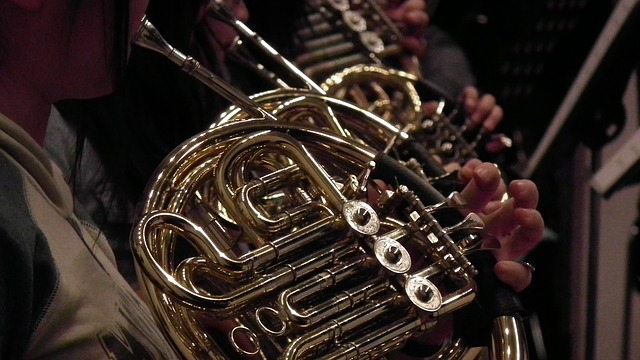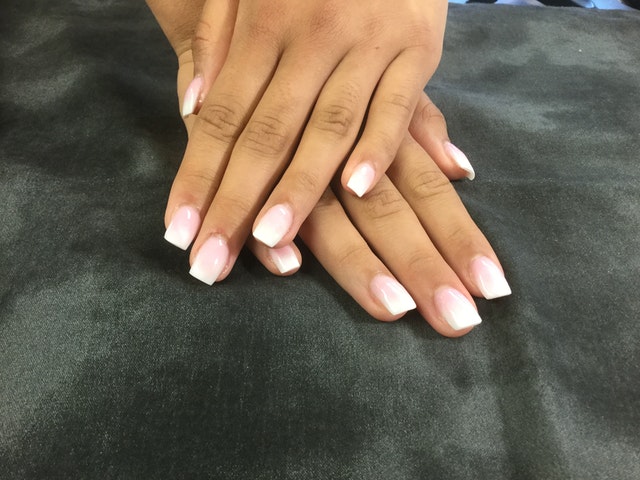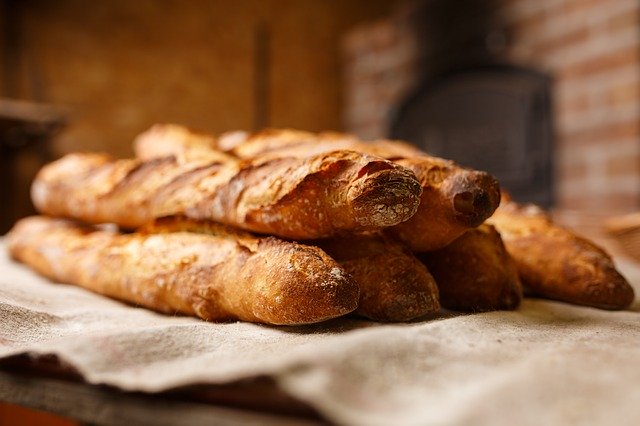Would you be surprised if I told you that French toast is not really a French thing? I’m sorry to burst your bubble, but it turns out many things you always thought were French originated somewhere else. I know what you’re thinking. They have been deceiving us our whole lives! We can’t trust anyone anymore! Disappointed face loading…
From gastronomy to fashion, to musical instruments and other devices, there is a long list of non-French things that for some reason became popular outside of France and are regarded as French. Let’s take a look at some of them. You might be surprised.
1. French Press

The French press is a coffee brewing device. The modern version consists of a cylindrical beaker made of glass or plastic. It comes with a plunger and built-in filter screen that “presses” hot water through ground coffee. Most coffee lovers agree that the flavor is much better than that of coffee made in traditional coffee makers.
There is a dispute surrounding the origin of the French press. According to many, this brewer has been used in France since the 1800s when it was discovered accidentally by a French man. However, the first official records date back to 1928 and credit Italians Attilio Calimani and Giulio Moneta.
This style of making coffee became popular in France in the 1950s, and American journalists started referring to it as French-press style coffee. So, is the French press French or Italian? We’ll probably never know, but we love the coffee we get from it.
Known in France as la cafetière à piston or bodum.
2. French Horn

The French horn’s origins go many centuries back to the times when people used hunting horns made of real animal horns. Eventually, they were made of wood or metal instead of horns. Then, in 1753, Hampel, a German musician, found a way to change keys by adding slides to them.
In the 19th century, the slides were replaced by valves, and that’s how the modern French horn was born. However, attributing its invention to only one person is not that easy. At most, it comes down to two people: Germans Heinrich Stoelzel and Friedrich Blühmel.
Why is it called French then? That has to do with the key the horn is pitched in: F. It was commonly referred to in England as the French horn, and this mistake was passed over to the Americas, where it remains a popular term.
Known in France as le cor d’harmonie or just cor.
3. French Doors
 The origins of French doors go back to the Renaissance. During those times, it became fashionable to have open space in the home. Architects gave great importance to symmetry, geometry, proportions, and regularity.
The origins of French doors go back to the Renaissance. During those times, it became fashionable to have open space in the home. Architects gave great importance to symmetry, geometry, proportions, and regularity.
The first doors were fastened with crosspieces, but then they were drilled into the bulkhead to allow more light in. In any case, they have always had embedded glass to serve a double function: door and window.
French doors became widely popular in Great Britain, and they eventually found their way to the U.S. They became a sensation in upscale homes in New York.
Although French doors DO indeed come from France, the term is now used to convey a certain prestige. After all, doesn’t it sound better than double-panel doors or patio doors?
Known in France as les portes-fenêtres.
4. French Twist
This hairdo was extremely popular from the late 1950s through the late 1970s and was associated with French high fashion. Currently, it’s only used in formal events like proms or weddings.
The French twist is created by gathering the hair in one hand and “twisting” the hair upwards until it turns in on itself against the head. It’s then secured with accessories like combs or hairpins.
Its origins go back to ancient Greece were women already used that look. It was probably due to French actress Brigitte Bardot that this hairdo became widely popular in the mid-20th century.
Known in France as le chignon.
5. French Braid
 The French braid is not remotely French. The earliest evidence of this popular hairstyle takes us to Algeria in North Africa. It has been around for at least 6,000 years and has been worn by women of Greek, Celtic, and Chinese origin as depicted in various pieces of art.
The French braid is not remotely French. The earliest evidence of this popular hairstyle takes us to Algeria in North Africa. It has been around for at least 6,000 years and has been worn by women of Greek, Celtic, and Chinese origin as depicted in various pieces of art.
The term itself has been used since the 1870s. It’s believed it was first used in a short story from Arthur’s Home Magazine at the time.
Since France has always been associated with fashion and high living, the term may have simply been assigned to this particular hairstyle even though it has been around for centuries.
Known in France as la tresse française.
6. French Manicure

Contrary to what many people believe, the French manicure did not originate in France. In fact, it’s not even that popular in France as compared to other countries. Where was it invented then? The answer is the U.S.! Yes, the French manicure is actually American.
The French manicure became extremely popular in Hollywood in the 1970s. Jeff Pink, the founder of nail polish and treatment brand Orly, is credited with its invention. It’s believed the term started to be used after the manicure made it to fashion runways. Like the French braid, it’s probably called French simply because we associate it with fashion.
Known in France as la French manucure.
7. French Poodle

Let’s talk about animals now. Did you know that the French Poodle does not come from France but Germany? Yes, I’m sorry to disappoint you.
The name comes from the German words Pudel (meaning “puddle”) and Hund (meaning “dog”). In France, this breed was standardized and worked as a water retriever. It rose in popularity and became France’s national breed.
Known in France as le caniche.
8. French Kiss
It’s funny when you find out there was no word for French kissing until recently. Yes, as you can imagine by now, it was not invented in France.
There are references to open-mouth kissing that go back to the Kama Sutra between 400 BCE and 300 BCE. The term as we know it was coined by American and British soldiers when they returned home from World War I. They referred to this style of kissing as French.
Many claim it has to do with our perception of the French as being sexually liberated or “libertines”. They may have learned it in France, but the truth is it has been around for ages.
Known in France as rouler un patin.
9. French Vanilla

Vanilla comes from a tropical plant that is not even grown in France. Why is it called French then?
The term was not for a type of vanilla but rather the classic French style of making vanilla ice cream with the use of a custard base. So, technically, yes, French vanilla is French.
Known in France as la vanille française or vanille bourbon.
10. French Toast

If you live in the U.S., you must have seen this in all menus of breakfast places. Although it’s widely popular in the U.S., the French toast is not French at all.
There is evidence that suggests the Romans soaked stale bread in eggs and milk to soften it as early as the 4th century. The term started to be used in the 17th century, but there’s nothing French about French toast.
Known in France as le pain perdu.
11. French Bread

French bread is one of France’s iconic staples, but is it really French? The answer is yes!
French bread has been made in France for centuries. There are old journals before the time of King Louis XIV that describe “long, thin breads being carried by scurrying housemaids preparing for a Gallic breakfast.”
Currently, French bread has become a synonym with any type of long white bread even if it was not made the traditional way. The term has been used in English since the 15th century to differentiate it from other types of bread.
Known in France as la baguette.
12. French Fries

This is my favorite by far. Who doesn’t love French fries after all? You can find them anywhere, from fast-food restaurants to upscale establishments. They’re widely popular among people of different nationalities, races, and social classes. But, are French fries French? Or is it another hoax?
There is an ongoing dispute between France and Belgium regarding the invention of fries. For a long time, they were considered to be of French origin, but then some evidence suggested they might have originated in Belgium. To add to the confusion, more recent evidence seems to indicate they’re French after all.
Fries were introduced to America by Thomas Jefferson after one of his visits to France. They became a huge success and have remained a popular snack/side dish ever since.
We’re not sure if French fries are Belgian or French, but we love them, don’t we?
Known in France as les frites.
Conclusion
As you can see, many things you thought were French are not French in reality. Some of them were labeled as French due to stereotypes, ignorance, or marketing purposes. In many cases, the term French is used because it’s associated with fashion, luxury, and high living, but more often than not, those things don’t have anything to do with France.
Were you surprised by any of the items on the list above? Did you already know about them? Let me know in the comments below. Au revoir, les amis!


Hi,
I enjoyed reading this post. I knew some of the “French” or not French things already, like French toast, French kiss, and French fries; none of them are French, yet they are called French, who knows why 😉 Someone suggested to me once that it might be because Americans have this love relationship with France?
I am from Belgium and we also call “French toast” lost bread, gained bread, just like in France, pain perdu. It is an age old recipe that people used to make old and stale bread edible again, so that is why it was called “lost bread, gained bread”, instead of having to throw it out, you gained new delicious bread slices 🙂
In Europe, everyone calls fries Belgian fries, well, most places where I have been to in Germany, Belgium, and also France. There is indeed an ongoing dispute between French and Belgians about this, since there is evidence that the French sold fries in the late 1800s at the Pont Neuf in Paris. However, other evidence suggests that a Belgian travelling merchant who travelled with a circus was selling fries in different towns wherever the circus passes through in 1845 or 1846, at an earlier date than the date the French first sold fries. This fact was discovered due to the existence of old documents in which this merchant was granted permits in each town to sell his fries. And Belgian fries are truly incredible!
In WWI American soldiers were introduced to fries in the trenches and the Belgian soldiers called them “frites”. Since those Belgians spoke French and not Flemish, the American soldiers must have assumed that the fries were French and they returned to their homes after the war, calling it French fries. There are some really interesting stories about foods and dishes 🙂
Hi, Christine,
It’s great to have the insight of someone from Belgium. As you mentioned, all of this might have something to do with the love-hate relationship between France and the U.S.
I didn’t know that Belgians also eat “lost bread”, but it doesn’t surprise me since you’re neighbors. I love learning new stuff like this.
We might never know the true origin of fries. Your explanation was very interesting and detailed. I can see why you’re a teacher. Thank you very much for stopping by and sharing this with us.
Hi Enrique,
it’s very interesting to watch how various things (especially foods and meals) are name, I’ve always been fascinated by this. It’s not a surprise half of the things called French whatever don’t have their origin in France.
In my native language which is Czech, we also say French manicure, French door and French kiss, however we have a special word for French fries that only reflects the shape of them. I also find it interesting that British people call them chips (fish and chips being one of the most popular meals), whereas American (and Czech people also) call chips thin slices of potatoes (e.g. Lays). In UK they call these crisps. A real confusion for many.
Hi, Lenka,
Yes, I agree it’s very interesting and strange at the same time. There is so much confusion. We grow up with the idea that something is called a certain way but never question ourselves why is that.
I love fish and chips lol. As you mentioned, chips go by different names in the U.S. and the U.K. The same applies to many other things even though they be in the same language.
Thanks for sharing your experience.
Hello,
I really enjoyed this article, especially because I live in Quebec Canada and have visited Paris France, more than once. I actually thought French braids were really a French thing… who knew? I also liked learning about the origins of the French horn and I’m glad to know that at least French bread is actually French. I like my bread! I love reading anything to do with the language and can’t wait for more entertaining articles like this one in the future! Thanks.
Michelle
Hi, Michelle,
Your comment is much appreciated.
I know! Personally, finding out that French fries might not be French after all was a shocker to me. I love them anyway. I’m not going to lie lol.
Which part of Quebec do you live in? I went to Montreal in 2017, and I loved it! I hope to go sometime soon.
Thanks for stopping by.
Hello Enrique, it’s really nice to be here and I really have to say I love what I have seen here, and finally with this wonderful article a lot of notion have been corrected and one I really thought was fresh is the French horn and seeing now I could almost argue it’s French. Thanks for the knowledge
Hey, Justin,
We always learn something new, don’t we?
Thanks for commenting.